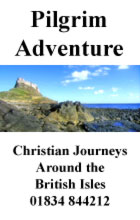Saint David (c. 500�589) (known in Welsh as Dewi Sant) was a church official, later regarded as a saint and as the patron saint of Wales. David contrasts with other national patron saints such as England's St George, in that relatively much is known about his life. However, his birth date is still controversial, with suggestions ranging from 462 to 512.
Early life
Rhygyfarch, the late 11th century author of the saint's life story (see below) wrote that David was the son of sanctus rex ceredigionis, where Sanctus has been interpreted as a proper name and its owner honoured by Welsh Christians as Sandde, King of Ceredigion. However, this Latin phrase can equally well mean simply "holy king of Ceredigion". The king of Ceredigion around the time of David's birth would have been Usai. According to Rhygyfarch, Sandde was his brother, so probably only a king of part of Ceredigion. They were sons of King Ceredig, founder of Ceredigion. The saint was conceived through violence and his poor mother, Non (possibly just 'a nun') the daughter of Lord Cynyr of Caer Goch (in Pembrokeshire), gave birth to him on a cliff top in the middle of a violent storm. David was educated at what is usually taken to be Whitland in Carmarthenshire under Saint Paulinus of Wales.
Monasticism
He became renowned as a teacher and preacher, founding monastic settlements and churches in Wales, Cornwall and Brittany in a period when neighbouring tribal regions (that were to be united as England three hundred years later) were still mostly pagan. He rose to a bishopric, and presided over two synods, as well as going on pilgrimages to Jerusalem (where he was anointed as a bishop by the Patriarch) and Rome. St David's Cathedral now stands on the site of the monastery he founded in the remote and inhospitable valley of 'Glyn Rhosyn' in Pembrokeshire.
The Monastic Rule of David prescribed that monks had to pull the plough themselves without draught animals; to drink only water; to eat only bread with salt and herbs; and to spend the evenings in prayer, reading and writing. No personal possessions were allowed: to say "my book" was an offence. He lived a simple life and practiced asceticism, teaching his followers to refrain from eating meat or drinking alcohol. His symbol, also the symbol of Wales, is the leek.
The best-known miracle associated with Saint David is said to have taken place when he was preaching in the middle of a large crowd at the Synod of Llanddewi Brefi. When those at the back complained that they could not see or hear him, the ground on which he stood is reputed to have risen up to form a small hill so that everyone had a good view. A white dove was seen settling on his shoulder � a sign of God's grace and blessing. The village which is said to stand on the spot today is known as Llanddewi Brefi. A more mundane version of this story is that he simply recommended that the synod participants move to the hilltop. John Davies notes that one can scarcely imagine a more uncalled-for miracle in that part of Wales. In works of art, David is frequently shown with a dove on his shoulder.
The document that contains much of the traditional tales about David is Buchedd Dewi, a hagiography written by Rhygyfarch in the late 11th century. One of Rhygyfarch's aims was that his document could establish some independence for the Welsh church, which was risking losing its independence following the Norman invasion of England in 1066. It is significant that David is said to have denounced Pelagianism during the incident before the ground rose beneath him.
William of Malmesbury recorded that David visited Glastonbury intending to dedicate the Abbey, as well as to donate a travelling altar including a great sapphire. He had a vision of Jesus, who said that "the church had been dedicated long ago by Himself in honour of His Mother, and it was not seemly that it should be re-dedicated by human hands". So David instead commissioned an extension to be built to the abbey, east of the Old Church. (The dimensions of this extension given by William were verified archaeologically in 1921.) One manuscript indicates that a sapphire altar was among the items King Henry VIII confiscated from the abbey at its dissolution a thousand years later. There are unverifiable indications that the sapphire may now be among the Crown Jewels.
Death
It is claimed that Dewi lived for over 100 years, and he died on a Tuesday, March 1 (now St David's Day). It is generally accepted that this was around 590, making the actual year 589. The monastery is said to have been 'filled with angels as Christ received his soul'. His last words to his followers were in a sermon on the previous Sunday. Rhygyfarch transcribes these as 'Be joyful, and keep your faith and your creed. Do the little things that you have seen me do and heard about. I will walk the path that our fathers have trod before us.' 'Do the little things' ('Gwnewch y pethau bychain') is today a very well-known phrase in Welsh, and has proved an inspiration to many.
David was buried at St David's Cathedral where his shrine was a popular place of pilgrimage throughout the Middle Ages. Unlike many contemporary 'saints' of Wales, David was officially recognised by Pope Callixtus II in 1123.
David's life and teachings have inspired a choral work by Welsh composer Karl Jenkins, Dewi Sant. It is a seven-movement work that is best known for the classical crossover series Adiemus, which intersperses movements reflecting the themes of David's last sermon with those drawing from three Psalms. |








